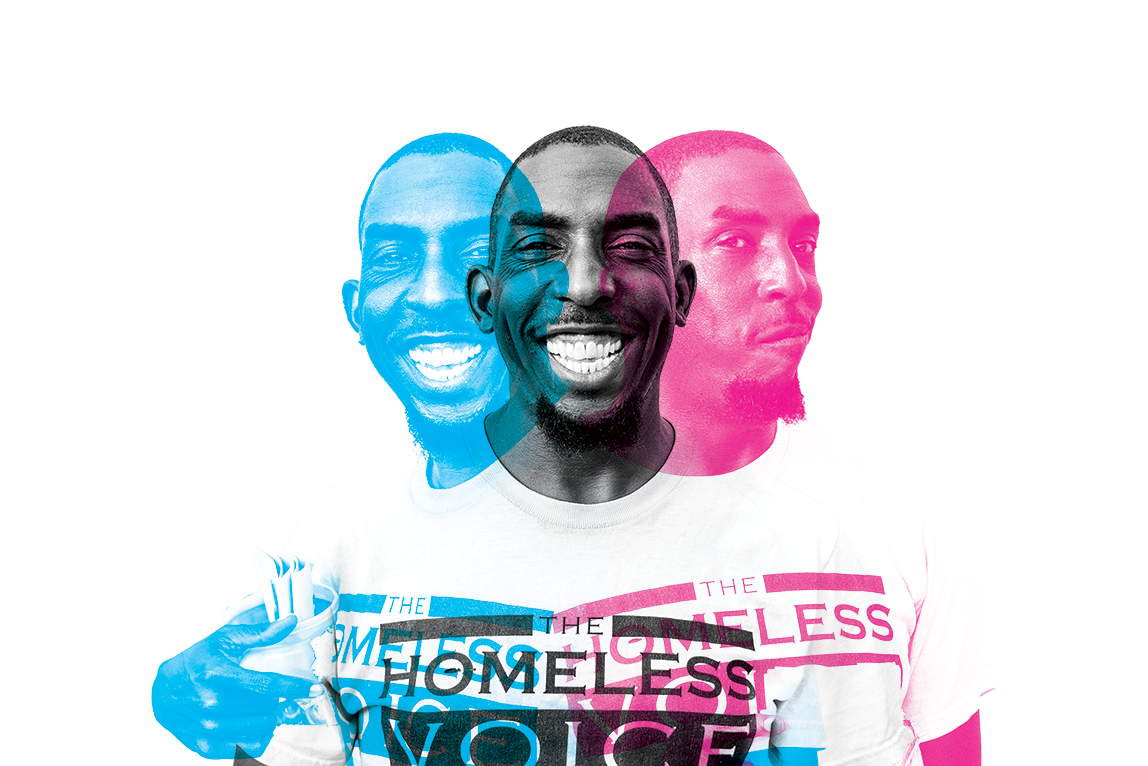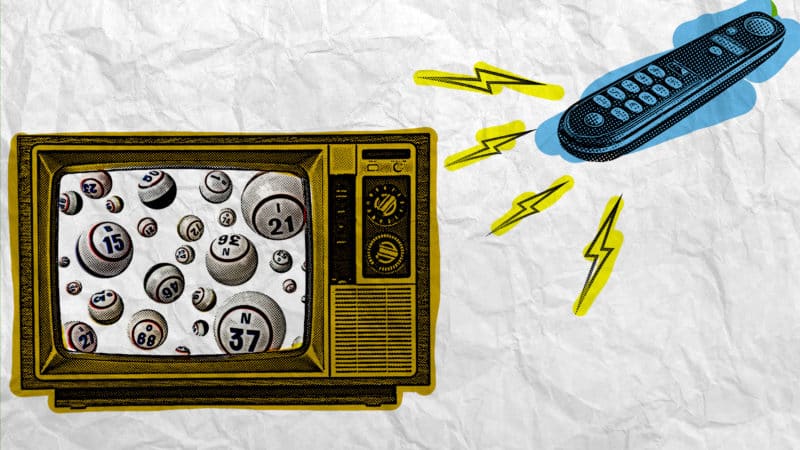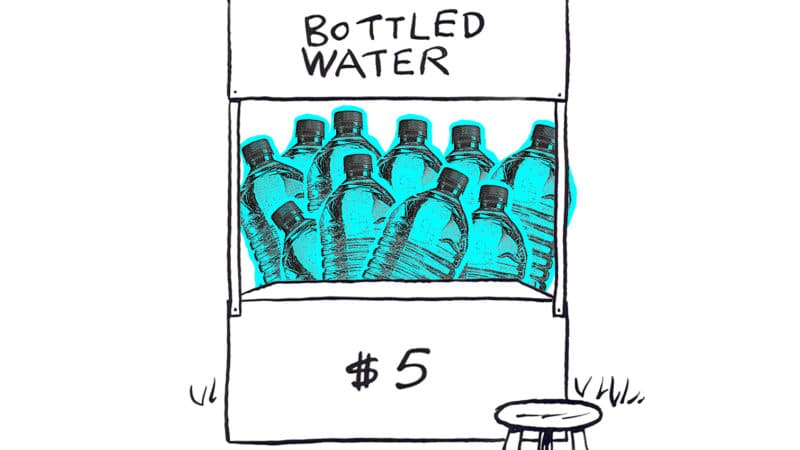From foster care to homeless: how the system failed him
Photos and Story By Miranda Schumes
Photo Illustration by Andrew Fraieli
Michael White stood on the center median at the busy intersection between Glades Road and St. Andrews Blvd in Boca Raton, Florida. It was 2002, and he was donning a lime green shirt with “The Homeless Voice” logo on the front, gripping a plastic bucket and selling newspapers in exchange for a donation. He had just taken a job with the COSAC Foundation, a charitable organization which helps house homeless people for a small fee. It also offers people an opportunity to sell newspapers on the street in exchange for a percentage of the sales, which can then go towards housing.
It was White’s first day on the job, and he hoped to make enough money to stay at the shelter that night, which would also guarantee him a meal. A car stopped just feet away from him. A mother sat in the driver’s seat, focused on the traffic ahead of her, waiting for the red light to turn green. A young boy sat in the back seat. He motioned for White to come over just before rolling down the window, holding out a ten dollar bill. As White went to take the donation, the window suddenly rolled up and trapped the young boy’s arm.
The boy screamed.
His mother stared coldly at the traffic in front of her, while keeping her finger on the button, not releasing her son’s arm.
The boy continued to shriek and tears streamed down his face. White grabbed the boy’s arm and tried to push it back through the window. “I knew he was in pain, and I saw the fear on the kid’s face that he didn’t really know what was going on… it was an unexplainable sound,” he said, his voice becoming gentler as he recalled the incident. The sound brought White back to his childhood, and he immediately burst into tears.
“I was not only angry, I was hurt, I was devastated. It just took me back to my childhood,” he said between breaths. White was abused as a child, just like the young boy seemed to be. While many years have passed since he was last abused, there is no escaping the painful memories that come from it. There is also no denying that White — well spoken, intelligent, personable, and polite — might not be homeless had his life played out differently.
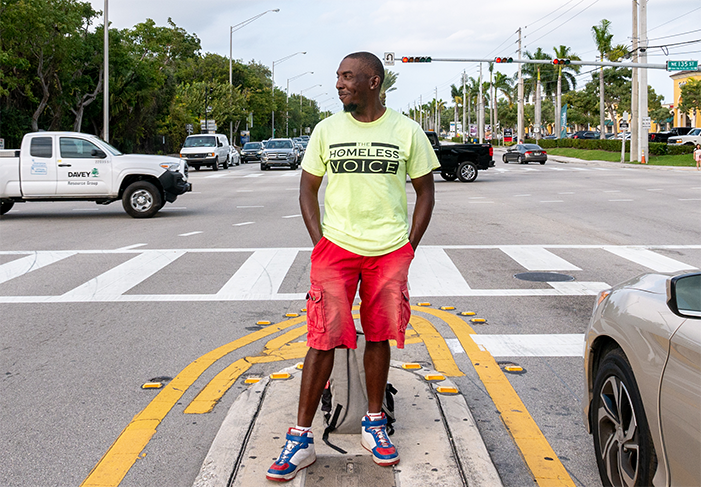
He is now 42 years old and lives in Dania Beach, but was born in Harris County, Texas. Soon after he was born, his mother moved him and his seven siblings to Los Angeles, California where they slept in a van until Child Protective Services took each child into custody. White was placed in the foster care system at one and a half years old, and moved from home to home throughout the Los Angeles area, eventually ending up in Compton for high school. He and his siblings had been separated and sent to live in different homes, resulting in White losing contact with them, and losing his only support system as well.
Growing up in the foster care system came with a number of difficulties for him. He was physically abused from the ages of two to 14, and, on top of that, White consistently got the impression that the California foster care system was more about making money than truly supporting a child’s needs.
He recalls one of his foster mothers constantly saying, “You are just my foster child. I can give you up anytime. I can get another one of you in a matter of days, in a matter of hours. You leave today, I’ll have another one of you tomorrow.” His foster mother’s family also expressed the same sentiments towards him.
“With all of that going on, you either do one of two things: you either kill yourself or you become an angry child, and the only thing angry children can do is misbehave,” White said. “I was just angry at what was going on, and I didn’t know how to express it.”
“I think that’s the stereotype as black men that we do get — that we’re thugs and we’re just trying to rob you. I don’t need to rob you. I’ve never stolen anything a day in my life. I’ll go without before I rob someone.”
White’s lashing out resulted in him living in over 20 foster homes until he turned 18. “You end up going from one home to another because they don’t think you’re capable of behaving yourself,” he explained.
His misbehavior finally ended in high school when he developed a closer friendship with Stephanie Dupin, a relative of one of his foster mothers. “She would pick me up, take me over to her house, and when I was with her, I felt like a normal child,” White said. “She made me feel like I was wanted, I was important, I was loved.”
When he was in his sophomore year of high school, Dupin passed away from kidney cancer at age 47. “That was one of the worst things I’ve ever experienced in my life because my mind said, ‘Now who’s going to protect me?’” White recalls.
All of the emotions hit him at Dupin’s memorial when he locked himself inside of a bathroom and “cried like a baby” on the floor.
“When I got up off the floor, I said to myself, ‘I have to change. I have to do something better. I have to do better than this because if nobody else is going to protect me then I have to protect myself.’”
White turned to reading, writing, and focusing on his schoolwork to distract from the abuse as well as the heartache of losing Dupin. He also joined the ROTC program at his high school.
At 18 years old, he aged out of the foster care system and, by law, was no longer entitled to live with a foster family. “If you’re not really prepared, or if they haven’t prepared you, it’s like they’re taking you to the streets, so I had to deal with that, and I almost committed suicide,” he said.
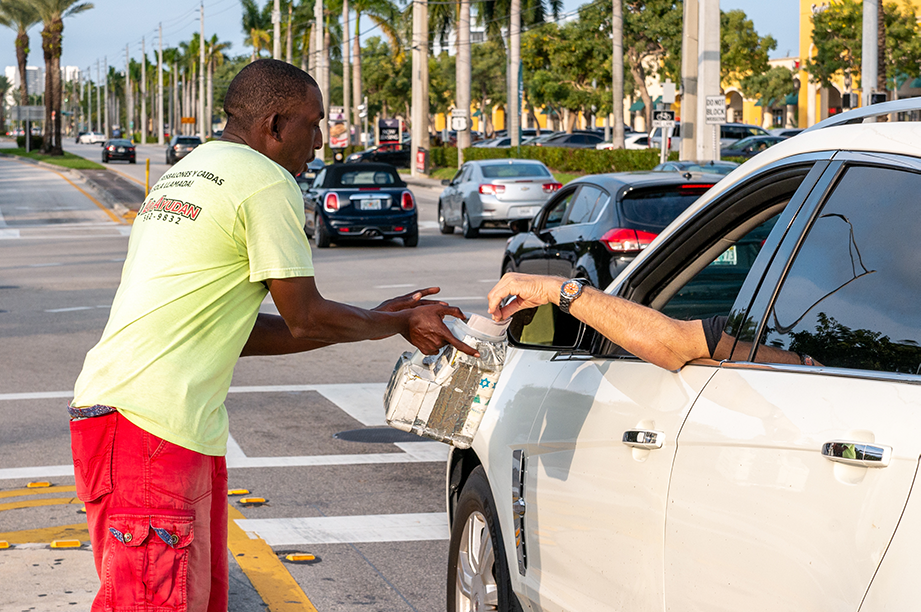
White ended up staying with a minister until he got accepted into Job Corps, a program within the U.S. Department of Labor, which helps people from the ages of 16 to 24 learn new skills and prepares them for the workforce. He applied for the training at the beginning of his twelfth grade year as he did not know where he would go after foster care.
“I knew I was going to have three meals a day. I knew I’d have a place to stay. I knew I’d have some sort of training. I’d be okay,” he said explaining his decision to enter the Job Corps.
He stayed at Job Corps for two years where he was enrolled in their hotel management program. He excelled there — finishing classes quicker than most as he was a fast reader. He also was Vice President of Job Corps’ Student Government and the president of the dorms.
Following his graduation from Job Corps, White worked at the front desk of a hotel in Long Beach for a short period of time, but decided to leave when he felt he would be unable to grow at the company due to his race. He and two of his friends from Job Corps decided to travel across the country in search of better opportunities. The three would start their morning at local day labor agencies to see what work they could pick up.
Most of the jobs that White found were in demolition and renovating. Still, neither White nor his friends were finding enough work or making enough money to survive. After traveling from state to state in search of job opportunities, the three finally ended up in South Florida.
“Just to come out here daily, have people curse you out, throw things at you, spit at you, put their dogs on you, lock windows — you start getting a mental picture that everybody hates you,” he explained.
White, who was starving because he did not have the funds to eat for three days, called 911 in search of help. The emergency line directed him to call 411 instead, with the operator telling him about the COSAC Foundation in Hollywood, Florida. When he arrived at the shelter, White — who is 5’7” — weighed only 120 pounds due to frequently lacking the funds to eat while on the road. After struggling to find consistent work, White decided to stay at the COSAC shelter with his friends deciding to continue on.
There, he was able to get meals in exchange for vending newspapers. This was an entirely new experience for White who had never done that type of work. “I’m a California boy, so vending papers means going door to door to sell papers, dropping papers off at a newsstand. That’s what my interpretation about vending papers was,” he said.
When White actually saw what vending papers entailed he was stunned. He never anticipated standing in the middle of a busy intersection vending newspapers to cars stopped at a light. “It was a new, shocking experience because you don’t do this in California,” he said.
Now, White has been with the COSAC Foundation on and off since 2002. In the times that he left, he would go in search of friends or potential family members to stay with. The COSAC Foundation has undergone some changes in that time as well. They no longer have a shelter in Hollywood, but instead have a home in Dania Beach.
When White vends newspapers, he is sometimes out the door by 5:30 a.m. to get on the shelter’s shuttle, which takes him to a location for the day to dispense copies of
The Homeless Voice
. He often does not return to the shelter until 7 p.m. White and the other vendors work six days a week, rain or shine. “We walk all day. Some of us don’t take any breaks and it’s just physically exhausting… a lot of people can’t do it,” he said. “A lot of people can’t come out here and take the abuse we take and smile about it.”
He understands that people often have a stigma towards those who are homeless — and is no stranger to it.
“Just to come out here daily, have people curse you out, throw things at you, spit at you, put their dogs on you, lock windows — you start getting a mental picture that everybody hates you,” he explained. “You feel like you’re not a human being to the point where you say, ‘I might as well kill myself’. People make you feel that you’re not worth it, that you don’t exist, that you’re trash even though they don’t even know you.”
White admits that people treating him this way often times leads to him feeling depressed. It disheartens him to know that many people assume he does drugs or has an addiction. In reality, he has never done drugs, does not smoke, and does not drink. “I’m a strong willed, strong minded kind of person, and it took me coming out here and doing this to even know that,” he said with conviction. When the job starts to take an emotional toll on him, he knows he has to just “keep going” and “keep striving.”
”What keeps me going is wanting to know what’s going to happen tomorrow and then wanting to see what’s going to happen the next day,” he said.
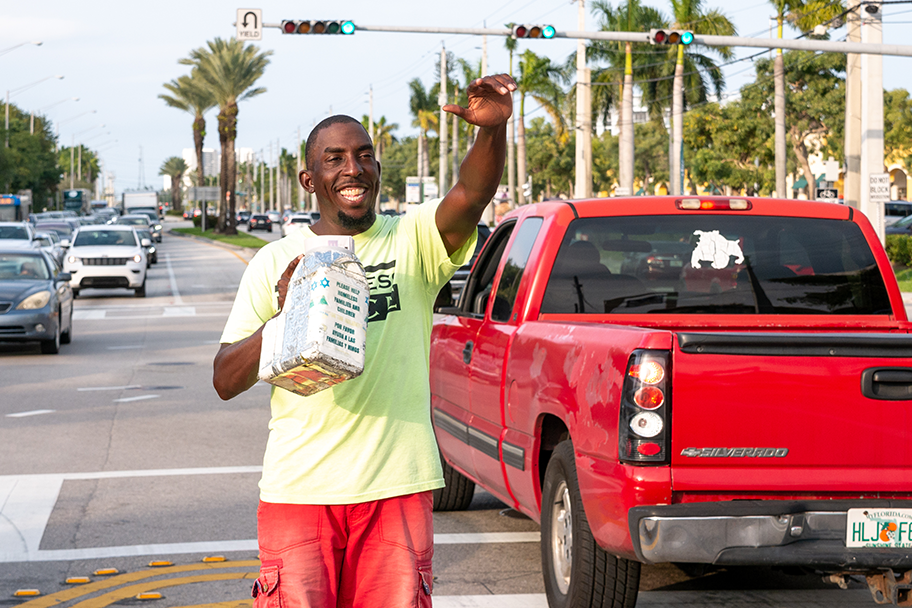
Still, it can be difficult to do that when it feels like people have already made up their mind about you. “Most people see me and they go, ‘You’re homeless — either you’re an addict or a thug,’” White said. “I think that’s the stereotype as black men that we do get — that we’re thugs and we’re just trying to rob you. I don’t need to rob you. I’ve never stolen anything a day in my life. I’ll go without before I rob someone.”
He wishes that people would ask questions before assuming anything about him. He also wishes people knew that he is intelligent. “I read constantly. I’m always reading something. I’m always trying to educate my mind — always trying to think beyond the basic boxes,” he said, elaborating on some of his favorite authors — Iyanla Vanzant, Gary Zukav, and Toni Morrison.
While reading provides him with a temporary distraction, he still wakes up everyday ready to brave strangers, stigmas, and whatever comes his way. White understands that not everyone has money to give and that does not bother him. He just wants people to be “kind” and “caring”.
“You don’t have to give me a dime. If you just say ‘Hi’ to me or ‘How’s your day going?’ — that makes me feel like a better person because that lets me know you’re at least thinking, you at least have me in some part, some fraction of your mind.”

